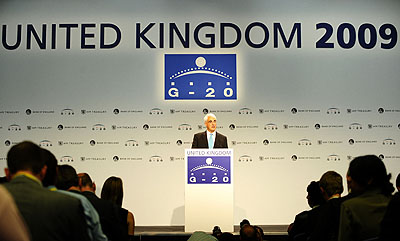|
 |
|
LOOKING TO THE FUTURE: British Chancellor of the Exchequer Alistair Darling speaks at a press conference in London on September 5 after the G20 finance ministers' and central bank governors' meeting (ZENG YI) |
In the wake of the global financial crisis, world economies have taken collective action and issued a series of economic stimulus plans, which have obtained positive results. Economists and observers have now concluded that the worst is over.
On September 4 and 5, G20 finance ministers and central bank governors, from industrialized as well as developing nations representing 80 percent of world economic output, gathered in London to discuss further action for the current economic situation that is showing signs of recovery.
They reached a consensus that, although the darkest time of global economic recession in the past 70 years has passed, the stimulus policy should continue until recovery is confirmed.
The London meeting was actually a precursor meeting for the G20 Pittsburgh summit, to be held in late September. The conclusions of the finance ministers and central bank governors are important points of reference with which G20 leaders determine future economic policies.
G20 finance ministers and central bank governors discussed dealing with the crisis with macroeconomic measures, promoting sustainable development, and reforming international financial institutions. The communiqué they issued after the meeting showed both compromises and differences among the countries.
Before the meeting, countries whose economies have achieved positive growth in the second quarter of 2009, like Germany and France, suggested it is time to consider abandoning large-scale stimulus policies. They expressed worry that stimulus packages can create inflation and heavy national debt after the world economy recovers.
Other countries, including China, India, Brazil and Russia, however, say a long time remains before the crisis will come to an end, and that countercyclical fiscal and monetary policies must be sustained.
Chinese Finance Minister Xie Xuren, for one, said China's stimulus policy has achieved obvious effects, and that the country's economic recovery has already gained momentum.
However, he stressed that the economic and financial foundation was not stable enough, and that further proactive fiscal and monetary policies are needed to stabilize the positive economic tendency and promote swift economic development.
Statistics show Asian countries, including China, Japan and South Korea, have stepped out of the lowest point ahead of other world markets. U.S. Treasury Secretary Timothy Geithner also warned that certain countries should not "step on the brake" prematurely, and that countries should continue to support economic development and the recovery of the financial sector until a firm basis has been cemented.
Finance ministers and central bank governors, meanwhile, offered different ideas on increasing International Monetary Fund (IMF) quotas.
In recent years, with developing countries increasingly contributing to the world economy, they have been voicing their desire to enhance their representation in international financial institutions such as the IMF.
Developed countries now possess about 60 percent of all IMF quotas—maintaining great decision-making advantages under the fund's framework. The United States previously said that, although America and Europe have a similar economic scale, the latter's IMF quotas remain almost double that of the United States.
Before the meeting, U.S. participants suggested a transfer of 5 percent of developed countries' IMF quotas to developing countries, so as to reduce European countries' voting advantage inside the IMF.
The Europeans, however, nullified the plan. Further, finance ministers from the European Union agreed to transfer an additional $75 billion to the IMF to maintain their advantage, while enlarging developing countries' quotas.
Critics also noted that the high-volume bonus system is driving financial practitioners to seek short-term profits over long-term and stable development. This, they note, has been at the root of the global financial crisis. Nonetheless, finance ministers and central bank governors had yet to reach a consensus on setting an upper limit to bonus payments for bankers.
Further Actions
The G20 finance ministers and central bank governors vowed to take additional steps to strengthen the financial system at their recent meeting in London. The steps include:
—clear and identifiable progress in improving corporate governance and compensation practices;
—stronger regulation and oversight for systemically important firms;
—rapid progress in developing stronger prudential regulation;
—consistent and coordinated implementation of international standards; and
—convergence toward a single set of high-quality, global, independent
accounting standards.
(Source: Declaration on Further Steps to Strengthen the Financial System)
| 